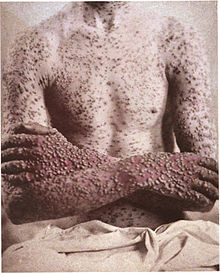- Clinical virology
-
Clinical or medical virology is a branch of medicine (more particularly of clinical pathology) which consists in isolating and/or in characterising one or several viruses responsible for some human pathologies by various direct or indirect techniques (cellular Cultures, serologies, biochemistry, molecular biology). It also consists in proving the absence of resistance of viruses in treatment antiviral by viral genome sequencing to adapt antiviral therapeutics at best.
Medicine: Pathology Principles of pathology Disease/Medical condition (Infection, Neoplasia) · Hemodynamics (Ischemia) · Inflammation · Wound healing
Cell death: Necrosis (Liquefactive necrosis, Coagulative necrosis, Caseous necrosis, Fat necrosis) · Apoptosis · Pyknosis · Karyorrhexis · Karyolysis
Cellular adaptation: Atrophy · Hypertrophy · Hyperplasia · Dysplasia · Metaplasia (Squamous, Glandular)
accumulations: pigment (Hemosiderin, Lipochrome/Lipofuscin, Melanin) · SteatosisAnatomical pathology Surgical pathology · Cytopathology · Autopsy · Molecular pathology · Forensic pathology · Dental pathology
Gross examination · Histopathology · Immunohistochemistry · Electron microscopy · Immunofluorescence · Fluorescent in situ hybridizationClinical pathology Specific conditions Myocardial infarctionCategories: Pathology
Wikimedia Foundation. 2010.

